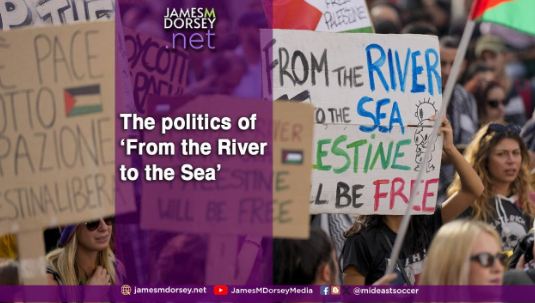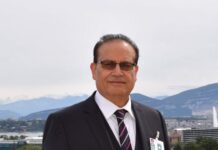It was 1977 and Mr. Begin had just become Israel’s first-ever right-wing leader. He took issue with a reporter asking what the difference was between the prime minister’s mainstreaming of references to Judea and Samaria, the Biblical names for the West Bank, that he claimed were part of the Jews’ historical land, and the Palestine Liberation Organisation or PLO’s call for a secular democratic state in Palestine.
Yet, the two propositions have much in common. Both envision one state in historic Palestine.
They differ about who would be the top dog in the unitary state. That fundamental contradiction remains at the core of the Israeli-Palestinian conflict and efforts to end the Gaza war, even if the terminology and its definitions have evolved.
Mr. Begin and his right-wing successors, including Prime Minister Binyamin Netanyahu, believed Palestinians should be, at best, a tolerated minority with a limited degree of autonomy under Israeli tutelage.
The PLO’s concept was nebulous until 1988, when the group’s leader, Yasser Arafat, recognised the state of Israel and agreed that the creation of an independent Palestinian state alongside its Jewish counterpart in the territories Israel conquered in the 1967 Middle East war would resolve the Israeli-Palestinian conflict.
Before 1988, the PLO’s notion of a secular democratic state envisioned a state that would be neither Muslim nor Jewish and grant all citizens equal rights, irrespective of ethnicity or religion.
Yet, at the same time, various PLO leaders called for Israeli Jews to return to their ‘homelands’ from which they or their parents had migrated, often to escape persecution.
Pro-Palestinian demonstration in the UK: Credit: The Conversation
‘From the River to the Sea, Palestine will be free’ is today’s successor to the notion of a secular democratic state with a substantial difference. It is no longer simply a call for the replacement of the Israeli state.
The slogan is undergirded by Israel’s loss of moral standing in the Gaza war and its settlement policy in the West Bank, which many believe renders an independent Palestinian state alongside Israel no longer feasible, even if that may not necessarily be accurate.
Those who believe that Israeli policy has made the notion of two states in historic Palestine impossible, one state for Jews and Palestinians is the only remaining realistic resolution of the Israeli-Palestinian conflict.
As a result, ‘From the River to the Sea’ harks back to the PLO’s concept of a secular democratic state, but with a greater emphasis on Jews and Palestinians having equal rights with no suggestion that Jews could be expelled.
The problem is that words have a long shelf life in the Middle East. The damage had already been done. It prompted Mr. Netanyahu to insist that Palestinian recognition of the state of Israel was no longer good enough. Instead, he demanded that the Palestinians recognise Israel as a Jewish state.
Hamas and Israel cemented the damage in the last seven months with the group’s October 7 attack on Israel and Israel’s subsequent devastation of Gaza.
Speaking last month to great applause at New York’s Columbia University, Norman Finkelstein, a scion of Holocaust survivors, critic of Israel, and an anti-Zionist, advised protesting students to craft their slogans carefully.
Norman Finkelstein at Columbia University. Source: YouTube
“It really takes a lot of hard work and a lot of sensitivity to the constituency that you’re trying to reach to figure out the right slogans… My own view is, some of the slogans of the current movement don’t work… You’ve got to pick the slogans, which are A not ambiguous, leaving no room for misinterpretation, and B have the largest likelihood at any given political moment to reach the largest number of people.,” Mr. Finkelstein said.
“I don’t agree with the slogan, ‘From the River to the Sea, Palestine will be Free.’ It’s very easy to amend and just say “From the River to the Sea, Palestinians will be free.’ (With) that little amendment you drastically reduce the possibility of being manipulatively misunderstood. You have.to adjust to the new political reality that there are a large number of people, probably a majority, who are potentially receptive to your message… Always keep in mind what we are trying to achieve at this particular moment,” Mr. Finkelstein added.
As a result, Mr. Finkelstein suggested that “Free Gaza, Free Speech’ would be the most effective slogan the students could adopt.
Without referring to it explicitly, Mr. Finkelstein appeared to acknowledge that many Israelis associate ‘From the River to the Sea’ with Ahmed Shukairy, Mr. Arafat’s predecessor as PLO leader, who, in the 1960s, insisted that Palestinians would “throw Jews into the sea.”
Hamas’ 2017 Charter. Credit: The New Arab
They also associate it with Hamas’ amended charter, adopted in 2017 that endorsed the principle of a Palestinian state in territory occupied by Israel since 1967, but at the same time rejected Palestinian recognition of Israel and insisted that the movement’s goal was “complete liberation of Palestine, from the river to the sea.”
Hamas’ targeting of civilians in its October 7 attack has reinforced Israelis’ interpretation of the term, ‘From the River to the Sea.’
Further muddling the debate about what Hamas may be willing to accept is the difference in strategy and tactics between today’s Hamas and the PLO of the 1980s.
To gain recognition by the United States, Mr. Arafat agreed to recognize Israel and renounce the armed struggle without a negotiated settlement in place.
Almost 40 years later, Palestinians are far worse off and nowhere closer to realising their aspirations.
That has led Hamas to conclude that Palestinians should play their trump cards of recognition of Israel and renunciation of the armed struggle only when agreement on a resolution of the Israeli-Palestinian conflict has been achieved.
That has not prevented Hamas leaders from entertaining formulas that would amount to recognition before a settlement and hinting that the group saw a Palestinian state alongside Israel as a long-term arrangement.
Against the backdrop of Hamas’ reference to ‘from the river to the sea” and the slogan’s embrace by pro-Palestinian protests potentially echo the words in the late 1970s of Mr. Begin’s defense minister and former Israeli president, Ezer Weizman.
Ezer Weizman meets Yasser Arafat in South Africa in 1994. Credit: Israel Government Press Office
Standing in front of a since abandoned emblem of the Likud Party that showed Jordan and the West Bank as part of Israel, Mr. Weizman said concerning the Palestine Liberation Organization charter that at the time called for Israel’s demise: “We can dream, so can they.”
At the time, roughly a year after Egyptian President Anwar Sadat’s historic 1977 visit to Jerusalem, Mr. Weizman and other Israeli leaders were contemplating granting Palestinians a degree of autonomy in the occupied territories. The notion of an independent Palestinian state was nowhere on the Israeli horizon.
The Israeli terminology has since changed, but today’s Israeli outlook is not much different from Mr. Weizman’s days, with Mr. Netanyahu insisting on “total victory” in Gaza and that “Israel must have security control over the entire territory west of the Jordan River” once the guns in Gaza fall silent.
Mr. Netanyahu’s phrasing, coupled with his public rejection since October of the notion of a Palestinian state and Israel’s Gaza war conduct, has in Palestinian ears the same ring that ‘From the Sea to the River’ has in Israeli ears: the rejection of the other’s rights and eradication of the other’s national existence.
And that is part of the problem. Slogans live lives of their own.
Mr Begin, as much a true believer in the tradition of the father of right-wing Zionist ideology, Ze’ev Jabotinsky, as he was a wily politician, understood that.
So does Mr. Finkelstein, even if he, like Mr. Begin, would likely shudder at being mentioned in the same breath.
Dr. James M. Dorsey is an Adjunct Senior Fellow at Nanyang Technological University’s S. Rajaratnam School of International Studies, and the author of the syndicated column and podcast, The Turbulent World with James M. Dorsey.

















